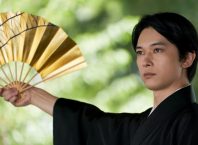Guy Ritchie’s ‘Sherlock Holmes’ begins with a bang and rarely slows down. It has fight scenes galore, which is to be expected from Ritchie. It has plenty of fast-fast verbal sparring, a touchstone of both Ritchie and star Robert Downey Jr.’s work. The only surprise in the film is how uninterested Ritchie is with practically anything else in the film. It has good, grimy, lived in production design- which just lies there, flatly, the camera rarely regarding it with interest. At no point does this film truly feel like it is set in Victorian England, as one is always aware of the underlying concept of the film- Guy Ritchie directs Robert Downey Jr. in ‘Sherlock Holmes’. It’s a bunch of professionals having a laugh. While not an unappealing idea, it struck me as a waste of effort and time. Why spend so much money on beautiful sets if you don’t really use them? It’s an entirely modern piece, with filmmakers content to see only the similarities to present day detective/crime films, when the differences would have been so much more interesting.
Still, after bemoaning the missed opportunity for the first half, the film does serve up some modest enjoyment as it goes on. Downey is as entertaining and relatable as usual (he is probably the most relatable star of his caliber) as Holmes. He is an inspired choice to play the role, as few actors are as capable at externalizing thought as he is. In one of the film’s best scenes, Holmes figures out a woman’s career and previous lover based entirely on the jewelry she is and isn’t wearing. Ritchie being Ritchie, of course, he is most interested in Holmes’ reasoning on how best to incapacitate a man in a fight- a blow-by-blow breakdown in Holmes’ mind, followed by the split second execution of said blows. The clues Holmes picks up that are actually essential to the film-the mundane ones, picked up here and there- those are the ones that actually need explaining, and Ritchie saves them for a boring expository speech at the end (logic that does not entail a person getting kicked in the groin just isn’t cool enough, apparently).
As Watson, Jude Law gives a very fun and very likable performance. He and Downey have a wonderful rapport, and we see some genuine life enter this initially tedious film. Like Brad Pitt – the best thing in Ritchie’s ‘Snatch’- Law is generally better and more varied in supporting roles than as your square-jawed leading man. The only other performance that engaged me was Kelly Reilly as Watson’s fiancée, Mary. She almost seems to come from a different film- a better one, where there is a fierce, fully formed vitality. She certainly made more of an impact than Rachel McAdams as Irene Adler, the American con-artist Holmes is infatuated with. McAdams is not a bad actress, but she typified Ritchie’s approach- she is a 21st century woman, dropped into this 19th century setting. There is not a single element in her role that feels in any way authentic- she’d be perfectly at home in the ‘Ocean 11’ movies.
Some really terrific actors are wasted here- Eddie Marsan as Scotland Yard’s detective Lestat and the great Marc Strong as the boring villain Blackwood. I’m not sure why he’s boring. He’s got a hell of a far-fetched evil plan, and should be at least chewing the scenery entertainingly. But the part is severely underwritten, and Strong has little to do but act menacing. Blackwell’s nefarious plot is decent pulp- killing parliament, taking over England and (for no apparent reason) conquering the colonies. It involves the occult and secret societies, which bare a strong resemblance to the film version of Alan Moore’s graphic novel ‘From Hell’, about Jack the Ripper (a good movie, of course disowned by Moore). It’s handled haphazardly, but it works, and has a fun resolution.
One of the most helpful elements in the film is the score, by Hans Zimmer. It’s a rather in your face type of score that many will probably be irritated by, but this Ennio Morricone infused score has more vitality and a more firm point of view about what its doing than the film itself. It’s a mix between Morricone’s classic spaghetti western scores, gypsy music, a bit of klezmer that evokes a period and a mood that lifted the film- it’s got the cheekiness the film is going for (the villain’s theme is a variation on the melody that precedes Big Ben’s hourly chime, which is fitting, considering how central parliament is to Blackwood).
This film is a missed opportunity. It is diverting enough, has a fun climax (with one great image), but it is encumbered by a sensibility that couldn’t care less about anything that could not fit in a modern buddy-cop movie. Hopefully the sequels will allow Ritchie (or whoever directs them) to embrace the unique opportunities this material provides, particularly with these actors. It is one of the first major film adaptations of Doyle’s creation since ‘The Private Life of Sherlock Holmes’, where the renowned acid-tongued cynic Billy Wilder revealed an aching romanticism often hinted at, but never so exposed. It’s a shame Ritchie couldn’t find something new in himself for this one- this film is plagued by a resounding lack of interest by a director that barely attempts to leave his comfort zone.





